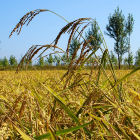
[BEIJING] The spread of genes from genetically modified (GM) crops to neighbouring wild plants, although inevitable, may not happen as quickly as feared, according to a study conducted in Chinese rice fields.
GM crop genes, such as those designed for insect resistance, can spread through cross-pollination with wild plants surrounding farmers' fields — an issue considered to be of major environmental concern, as little is known of the ecological consequences of such gene spread.
But a study by Chinese scientists has found that gene flow of this type is unlikely to occur rapidly, as the transferred genes — or 'transgenes' — do not actually enhance the survival of wild plants. This is because the number of insect pests would have already been reduced in the local area due to the GM crops' insect-resistant genes.
The researchers from Fudan University and the Fuijan Academy of Agricultural Sciences crossed a rice strain that had been genetically modified to carry an insect-resistant gene with a wild, 'weedy rice' strain, and then tested the survival of their progeny four generations later in an experimental field setting in Fuzhou, in Fujian Province, China.
The scientists compared survival rates of progeny containing the insect-resistant transgene with those not containing it, and with survival rates of the original wild rice plant, under conditions of low and high insect pest numbers.
The results showed that when pressure from pests was high, the transgene gave the hybrid varieties a fitness advantage in all tested fitness traits, such as number of seeds produced. However, when the number of insect pests was lower — as is the case in areas surrounding GM fields — hybrids containing the transgene did no better than unmodified wild rice in most fitness traits.
Bao-Rong Lu, chairman of the ecology and evolutionary biology department at Fudan University in China, and a lead author of the study, said that by tracing the fitness of the first four generations of hybrids the researchers had shown that "GM rice will not cause serious environmental problems".
Wei Wei, an ecologist from the Institute of Botany at the Chinese Academy of Sciences, welcomed the study, but said further evidence was needed to confirm the findings.
Xue Dayuan, chief biodiversity scientist at the College of Life andEnvironmental Sciences at the Minzu University of China, told SciDev.Net the field tests were limited in what they can show.
"It's totally different with the open field. Under the different climate and ecological environments, the risk from the potential transgene flow or transgene pollution may be more likely to happen," Xue said.
And Bruce Tabashnik, a professor of zoology from the University of Michigan, United States, told SciDev.Net that the paper was correct in saying that it "is less likely that the transgenes will spread rapidly" when the pest population is slow.
But he added that some key questions remain, including the extent to which GM rice will reduce the number of pest insects.
The study was published in PLoS ONE last month (17 July).
Link to full article in PLoS ONE  [174kB]
[174kB]

No hay comentarios:
Publicar un comentario